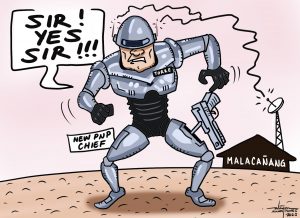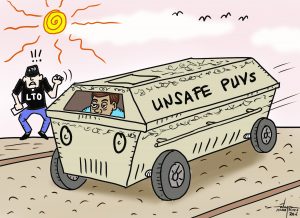So Donald Trump won. This is an incredible “return of the comeback” that would surely inspire many of our local politicians.
Trump’s victory will embolden our local politicians who have been convicted of crimes and those who have plotted to overthrow the government at one point or another. This will also assure our celebrities – major and minor – that you do not need competency, just popularity.
After all, our Philippine political system has been shaped by our American colonizers and Filipino politicians tend to follow their advice, their policies, their practices, and their trends.
I guess this is democracy?
But, wait, mainstream media in the US repeatedly said that Trump is a ‘fascist dictator’ who will take away fundamental rights and will be bad for the developing world and for the planet.
Does it mean that is what Americans want now instead of democracy? Or has democracy evolved into another form? And if we are America’s followers, are we going in that direction, too?
Judging from the selection of candidates for the 2025 elections, I think we might be.
Many feminists in the US are saying Americans are more willing to elect a criminal than a woman for president. Others argue that it “depends on the woman” and that they think Kamala Harris (or Hilary Clinton before her) just isn’t the “right woman.” But Trump, apparently, is the right man.
I am baffled. Just how perfect a woman do you have to be to be President of the United States?
In the Philippines, we have had two female presidents — a housewife and widow of a slain opposition politician turned martyr; and an economist and daughter of a former president. Both women faced many challenges including military coups, massacres, election cheating, and corruption scandals. Both got to be president through extraordinary means —“people power” (one and two). Is there a pattern here?
Well, if Trump’s second win (both times against women candidates) is an incredible comeback, our own President Ferdinand “Bong-Bong” Marcos (BBM), Jr.’s electoral victory was quite amazing as well in the history of comebacks. The only difference is BBM was helped by a woman, instead of running against one. Although BBM did run against a woman, Leni Robredo, who is now being seen as Kamala’s Philippine version (she had the most big celebrity endorsements and most woke supporters and still lost).
Actually, if you come to think of it, BBM had a lot of help from a lot of women, not just his running mate. From his mother, his sisters, his wife, the other former female president who’s still alive, and more.
There is a lesson here somewhere and in time I will figure it out.
Meanwhile, if Leni is Kamala, some Filipinos are saying that Trump is America’s version of Rodrigo Duterte. And that both men became fast friends and really like each other. Why? Patriarchy is my short answer.
But political analysts are saying there is a global trend towards populism and that is why the Trumps and Dutertes of this world are winning.
Populism in politics is a style or approach that seeks to appeal to the general public. It often emphasizes a divide between “ordinary people” and a perceived elite or establishment. Populist politicians typically present themselves as champions of the common people, positioning themselves against the “corrupt” elites or institutions they claim are out of touch with the needs and concerns of regular citizens.
They appeal directly to the public. They use emotive language (cursing like the urban poor to make them seem like one of them), use slogans (like “Make America Great Again”), simplified policy explanations (Bagong Pilipinas?), or dramatic public appearances (like senate inquiries). Social media has been a powerful tool for modern populists, allowing them to bypass traditional media and communicate directly with their base.
Their messages often focus on “Us versus Them” mentality, dividing groups like “the people” versus “the elites” or the criminal drug addicts against the innocent law-abiding citizens or the legal citizens against illegal immigrants. Making complex political issues seem simpler and centering blame on specific groups or individuals instead of presenting a systemic way of solving social problems.
These populist leaders are described as charismatic, who claim to speak for the people. They develop a cult following because they promise quick (sometimes violent) solutions to complex problems. And they can be left-wing populists or right-wing. It covers all ideologies.
If this is the global trend now (and we know how Filipinos are trendy), what can we do to be better citizens given the current state of our democracy?
Resisting populist politicians who employ divisive, authoritarian or anti-democratic tactics requires a combination of individual actions, civic engagement, and institutional resilience. Here are three concrete things we can do now as we prepare for our own coming elections:
One, promote media literacy and fact-checking. We need to educate ourselves and others. Populist politicians often exploit misinformation or sensationalist claims to rally support. We need to learn how to critically assess sources of information, recognize bias, and fact-check claims to help reduce the spread of misinformation. Related to this, we need to support independent media that hold leaders accountable.
Two, promote civic awareness and constructive dialogue. This will help people recognize the tactics populists use to concentrate power, fostering a more informed and resilient public. Avoid polarization because populist politicians thrive in a divided society. Reach out and understand people who have different views from yours and find out their real grievances without judgment. By focusing on real issues rather than personalities, we can find solutions that we can agree on.
Three, promote youth engagement and invest in education. Engage young people in politics and civic life by fostering their understanding of democratic values and encouraging them to participate in constructive political activities. Build our democratic institutions by investing more in education, especially in areas like history, critical thinking, and media literacy, which will help citizens understand the complexities of democracy and resist simplistic populist messages.
Sure, it’s a mad world and everybody wants to rule the world, to borrow two song titles from Tears for Fears. But it is our world, too. Democracy isn’t just about elections and we can make meaningful changes even when we are not (and maybe because we are not) the elected politicians. There are only few of them and so many of us. We will outlive them, outsmart them, and outgrow them. We can turn this around. Let’s start with the three things above.


